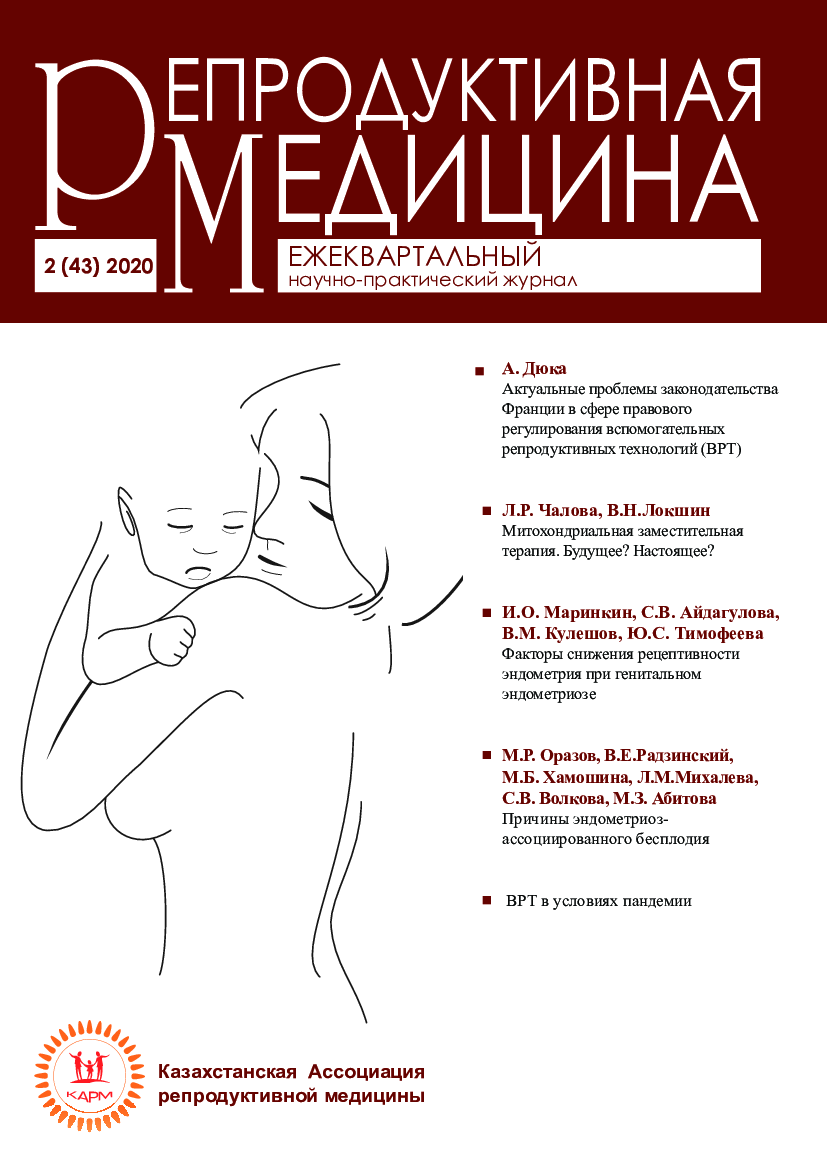Legal regulations of ART in French legislation
DOI:
https://doi.org/10.37800/RM2020-1-11Keywords:
assisted reproductive technologies, surrogacy, French legislation, ART reformsAbstract
France is one of the rare countries which implements the fundamental mechanism for improving legislation on Bioethics.
Since 1994, every five years bioethics laws are revised in order to follow medical advances (medicine), authorize new practices
and impose restrictions, expressly in order to guarantee the fundamental principles laid down by the Law N94-653 of 29 July
1994 (dignity, primacy of the human person, inviolability, integrity and non-ownership of the human body and its elements).
Medically assisted procreation (ART) is one of the fields under regular review. This article outlines the French law on ART and
surrogacy. In spite of the fact that surrogacy is prohibited in France, the infertile couples seek surrogacy outside of the country.
Over the last few years, under pressure from the ECHR and expressly to protect child interests, the French relaxed their position
in order to recognize the affiliation of children born from surrogacy. The current revision of bioethical laws aims, among other
things, to open up access to ART for all women (including single women and lesbian couples) and to simplify the recognition in
France of the affiliation of children born by surrogacy abroad.
References
Гражданский Кодекс Французской Республики. Национально-правовой портал. https://www.legifrance.gouv.fr/https://www.legifrance.gouv.fr/affichCode.do?cidTexte=LEGITEXT000006070721
Уголовный Кодекс Французской Республики. https://www.legifrance.gouv.fr/affichCode.do?cidTexte=LEGITEXT000006070719&dateTexte=20200624
Кодекс законов о Здравоохранении https://www.legifrance.gouv.fr/affichCode.do?cidTexte=LEGITEXT000006070719&dateTexte=20200624
Закон № 94-653 «Об уважении человеческого тела» https://www.legifrance.gouv.fr/affichTexte.do?cidTexte=JORFTEXT000000549619
Закон N94-654 от 29 июля 1994 года о донорстве и использовании элементов и продуктов человеческого организма, медицинской помощи при деторождении и перинатальной диагностике. https://www.legifrance.gouv.fr/affichTexte.do?cidTexte=JORFTEXT000000549618
Распоряжение Министерства Юстиции от 25 января 2013 г. По вопросам приобретения французского гражданства детьми, рожденными в рамках суррогатного материнства за границей NOR: JUSC1301528C http://www.textes.justice.gouv.fr/art_pix/JUSC1301528C.pdf
Директиве №2004/23/СЕ от 31 марта 2004 года об установлении норм качества и безопасности в отношении пожертвования, получения, контроля, трансформации, консервации, хранения и распределения человеческих тканей и клеток. https://eur-lex.europa.eu/legal-content/EN/NIM/?uri=CELEX:32004L0023
Протокол № 16 к Европейской конвенции о правах человека, позволяющий запрашивать заключение Европейского суда по правам человека относительно толкования или применения защищаемых прав и свобод, вступил в силу 1 августа 2018 года. Advisory Opinion concerning the recognition in domestic law of a legal parent-child relationship between a child born through a gestational surrogacy arrangement abroad and the intended mother - Request no. P16-2018-00.
Brunet L., Carruthers J., Davaki K., King D., Marzo C. McCandless J. A comparative study on the regime of surrogacy in EU member states: study. European Parliament 2013. http://www.europarl.europa.eu/studies
Baillon-Wirtz N., Honhon Y., Le Boursicot M-C., MeierBourdeau A., Omarjee I. L’enfant sujet de droits, Filiation, Patrimoine, Protection. Lamy 2010.
Crockin S., Howard W. Legal Conceptions, The Evolving Law and Policy of Assisted Reproductive Technologies. The John Hopkins University Press, Baltimore 2009.
Jouannet P., Vincent C. L’Embryon, le foetus, l’enfant : assistance médicale à la procréation et lois de bioéthique : une réflexion transdisciplinaire médicale, juridique, éthique et patrimoniale ». Editions ESKA 2009.
Saarloos K-J., European private international law on legal parentage? Thoughts on a European instrument implementing the principle of mutual recognition in legal parentage, Maastricht University 2010.
Fabr-Magnan M., La gestation pour autrui. Fictions et réalité, Paris, Fayard 2013.
Sosson J. La gestation pour autrui: vers un encadrement? Bruylant. Bruxelles 2013.
Salamé G. Le devenir de la famille en droit international privé. Une perspective postmoderne. PUAM 2006.
Leroyer A-M. Droit de la famille. PUF 2011.
Théry I., Leroyer A-M. Rapport sur Filiation Origines Parentalité. Le droit face aux nouvelles valeurs de responsabilité générationnelle. Editions Odile Jacob 2014.
Cahn N. The New Kinship Constructing Donor-Conceived Families. New York and London 2013.
Trimmings K., Beaumont P. International surrogacy arrangements: legal regulation at the international level. Hart Publishing, Oxford and Portland, Oregon 2013.
Jouannet P., Vincent C. L’Embryon, le foetus, l’enfant : assistance médicale à la procréation et loisde bioéthique : une réflexion transdisciplinaire médicale, juridique, éthique et patrimoniale». Editions ESKA 2009.
Additional Files
Published
How to Cite
Issue
Section
License
The articles published in this Journal are licensed under the CC BY-NC-ND 4.0 (Creative Commons Attribution – Non-Commercial – No Derivatives 4.0 International) license, which provides for their non-commercial use only. Under this license, users have the right to copy and distribute the material in copyright but are not permitted to modify or use it for commercial purposes. Full details on the licensing are available at https://creativecommons.org/licenses/by-nc-nd/4.0/.




